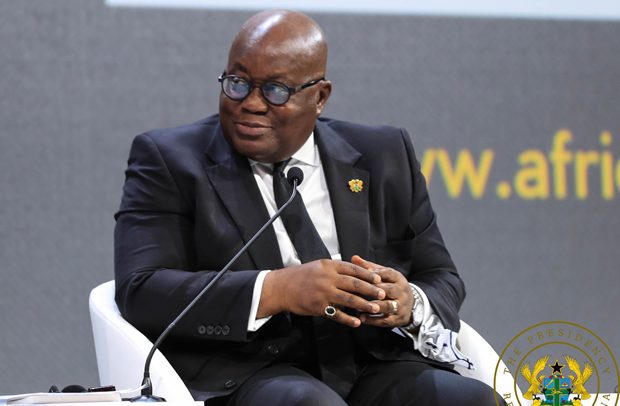President Akufo-Addo
President Akufo-Addo has stated that allegations of corruption against his appointees have so far been investigated by independent institutions mandated to carry out such functions.
President Akufo-Addo stressed that “there is also the attitude of those of us who are in office.”
He explained that “so far, investigations have not yielded any evidence of appointees indulging in corruption, but it’s important that it’s known that people of my administration will be subjected to scrutiny if they go off schedule.”
President Akufo-Addo made this known yesterday when he spoke as a panelist during the “Championing Investments: Presidential Investment Chats” at the ongoing Africa Investment Forum organized by the African Development Bank in Johannesburg, South Africa.
The President recently established the Office of Special Prosecutor to fight against corruption in Ghana.
It would be recalled that the allegations against the then Minister for Energy-designate, Boakye Agyarko, during the parliamentary vetting were investigated by a bi-partisan committee of Parliament which exonerated him.
Allegations against the then Chief Executive Officer (CEO) of BOST, Alfred Obeng, two deputy Chiefs of Staff, then deputy Minister for Youth and Sports, Pius Enam Hadzide, and Board Chairman of the National Sports Authority, Kwadwo Baah, were investigated by the Criminal Investigations Department (CID) of the Ghana Police Service.
Additionally, allegations of extortion against the Trade Minister, Alan Kyerematen were also investigated by a bi-partisan committee of Parliament, which exonerated him.
“Together with others, they have all been investigated, and no evidence has been adduced to suggest mildly the perpetration of any act of corruption,” President Akufo-Addo emphasised.
Reveals Secret
He shared the stage with Guinean President, Alpha Conde, Nigerian Vice President, Yemi Osinbanjo and South African business magnate, Patrice Motsepe during the programme.
Ghana came up for discussion when moderator of the Presidential Investment Chat, Nozipho Mbanjwa of CNBC Africa, asked President Akufo-Addo about the secret behind the country’s sudden rise in business rankings, which has attracted the attention of the investor community.
In his swift response, he said, “I think that the focus that is bringing the limited success that we are seeing in Ghana is that government is focused or trying to do what it needs to do, which is not, first of all, to get away from any idea that is a competitor to our private sector or government can substitute itself for the private sector.”
Instead, he said “the role of government, in our view, is to be a facilitator for the development of the Ghanaian private sector and that has been the focus of our government.”
He said the rule of law is working for not only Ghanaians but foreign investors as well.
President Akufo-Addo revealed that government had decided to improve the capacity of the state to manage the country and the economy.
President Akufo-Addo said it was unacceptable for 1.5 million Ghanaians, out of about 30 million, representing less than six percent, paying taxes.
That notwithstanding, he said “the state itself at the moment still doesn’t have the capacity to be able to make sure that those who should be in the tax net are in the tax net.”
President Akufo-Addo was of the belief that Ghana as a country is capable of financing its development process, adding that he intends to build a Ghana beyond aid through the implementation of appropriate policy frameworks that drive business investment.
“Those are the measures that are occupying the attention of my government.”
He said when he assumed office, the growth of the agric industry was in negative figures.
“We decided to implement the ‘Planting for Food and Jobs’ policy, the first year of which identified 200,000 smallholder farmers received government support, through the provision of farming inputs, insecticides, fertilisers and access to extension officers.
He observed that the programme has provided support to some 500,000 farmers this year.
“The impact of the ‘Planting for Food and Jobs’ policy has made on agric farmers in terms of yield excites me; we are seeing much greater output of food to our markets across the country than we saw three or four years ago; that is the connection that we are trying to make to see how we can bring whatever authority government has to support these initiatives with appropriate policies.”
Going forward, he maintained that “our goal is that within four years, a million farmers will be in this programme.”
By Charles Takyi-Boadu, Johannesburg, South Africa


